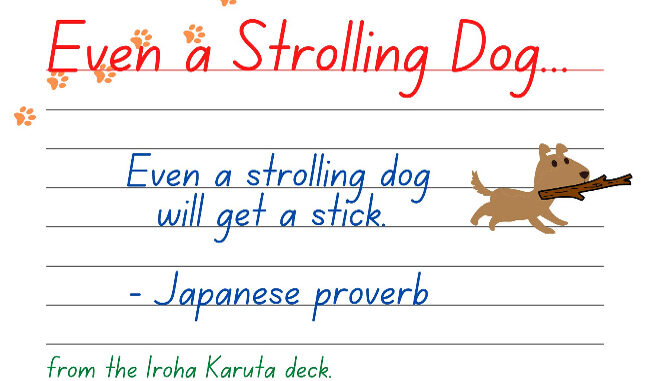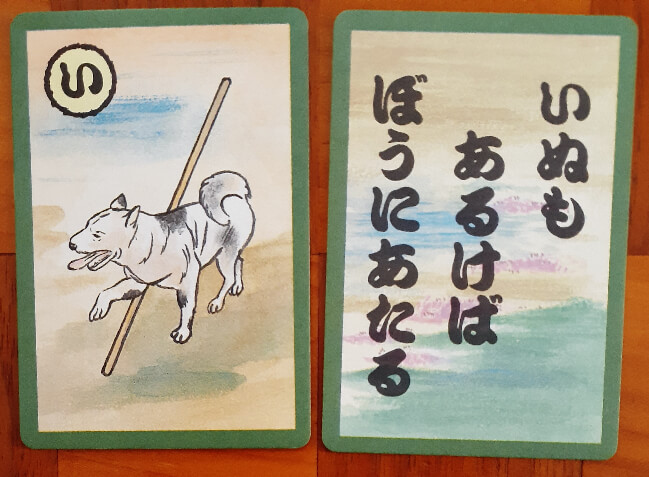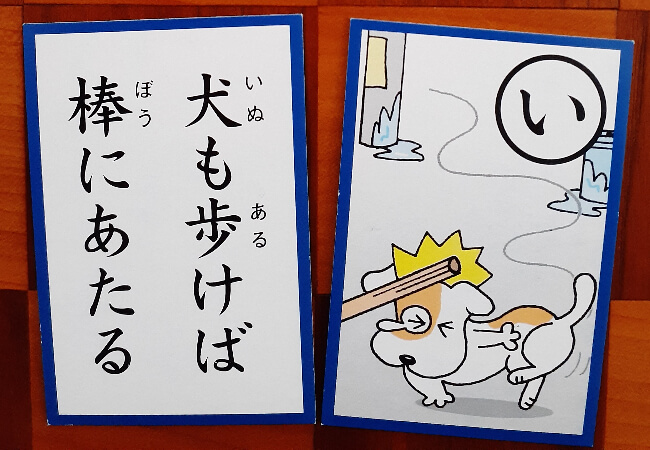
Japanese is a language rich in amusing proverbs and sayings about everyday life. Some of the most famous ones are those that you can find in the popular Iroha Karuta card-grabbing game.
How to Play
In the game, picture cards are laid face up on the playing surface. Each picture card also shows the character syllable (or “kana”) that the first word begins with. There are 48 proverbs in all, one for each kana of the Japanese hiragana syllabary.
One player is the “reader” and reads the proverb cards at random and the other players try to grab the picture cards. As soon as you hear the opening syllable you can try and grab the appropriate card as quickly as you can. The winner is the player who grabbed the most cards.
As you can see from the photos, the card decks come in different styles. The green bordered cards shown above are the sort you can find in a bookshop or stationary store, carefully designed and tastefully illustrated, with the readings all in the syllabic “hiragana” script. The deck shown below is a cheap set you can get for just a dollar in any “100 yen shop” and great value for money:
I like the cheerful cartoon images and the use of Chinese “kanji” characters with “furigana” written alongside to help children read the characters.
It’s great fun to play and helps you to improve your reading and listening skills as well.
Translation
The proverb I’m looking at today is probably the most famous of the whole set because it is the first card in the series.
犬も歩けば棒に当たる
Inu mo arukeba bō ni ataru
A word-for-word translation would go something like this: [Dog also if-were-to-walk stick by find].
Typical translations go something like this:
“If a dog walks it will hit a stick.” (Google Translate)
“If a dog walks, it will get hit by a stick.” (Hiragana Times)
“Even a dog, if it walks, will bump into a pole.” (Romajidesu)
There are many other versions out there. The two cruxes are (1) whether or not to translate “mo” as “even” or “also,” or to ignore it, and (2) whether to render “ataru” as something like “hit,” or “be hit by.”
In the case of “ataru” it seems that its meaning has shifted somewhat over time, or rather expanded to include the idea of “hitting upon” or “finding” something as well as the older meaning of “hit” or “strike”.
Here’s how I translated it:
“Even a strolling dog will get a stick.”
I decided to use the phrase “get a stick” in my translation because it hints at a double meaning: the dog “hits upon” or “finds” a stick (a modern interpretation), or (the original meaning, it seems) is “hit by a stick” (wielded by an irritated human, no doubt). Either way, the dog “gets” a stick.
Interpretations
The original interpretation was something like this: even a stray dog wandering around can meet with disaster so don’t you go aimlessly wandering about otherwise you might get clobbered by misfortune too.
The modern interpretation turns it around to suggest that if even a walking dog can find a stick you might find something too if you go about. You never know what good thing might come your way if you go exploring.
However, my personal interpretation is perhaps a little more cynical or contemptuous, since I always think of it like this:
Well, congratulations [sarcastic clapping] for hitting upon something, BUT EVEN A DOG will find a useless stick if it wanders about enough.
Which interpretation do you prefer, or do you have one of your own?
Cheers!
David Hurley
#InspiredFocus
#Index4Index
A slightly different version of this post can be found on Liketu



Hi! Thanks for posting this! I have been doing research for an animation project I am doing about Karuta, and your blog will certainly help me! Thanks again!